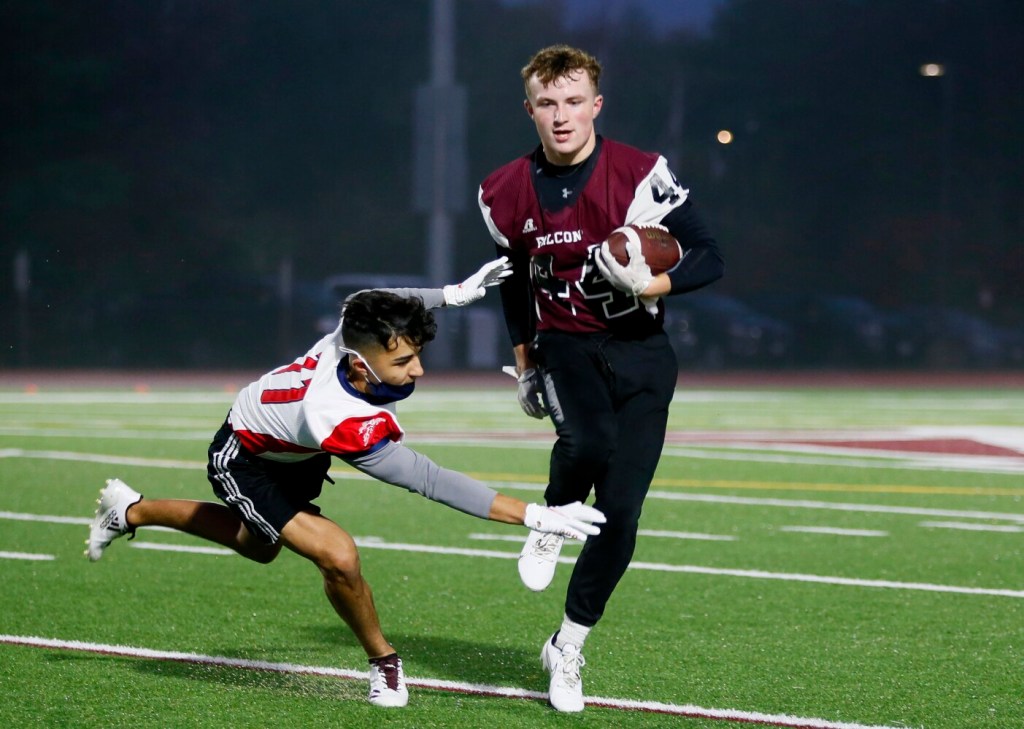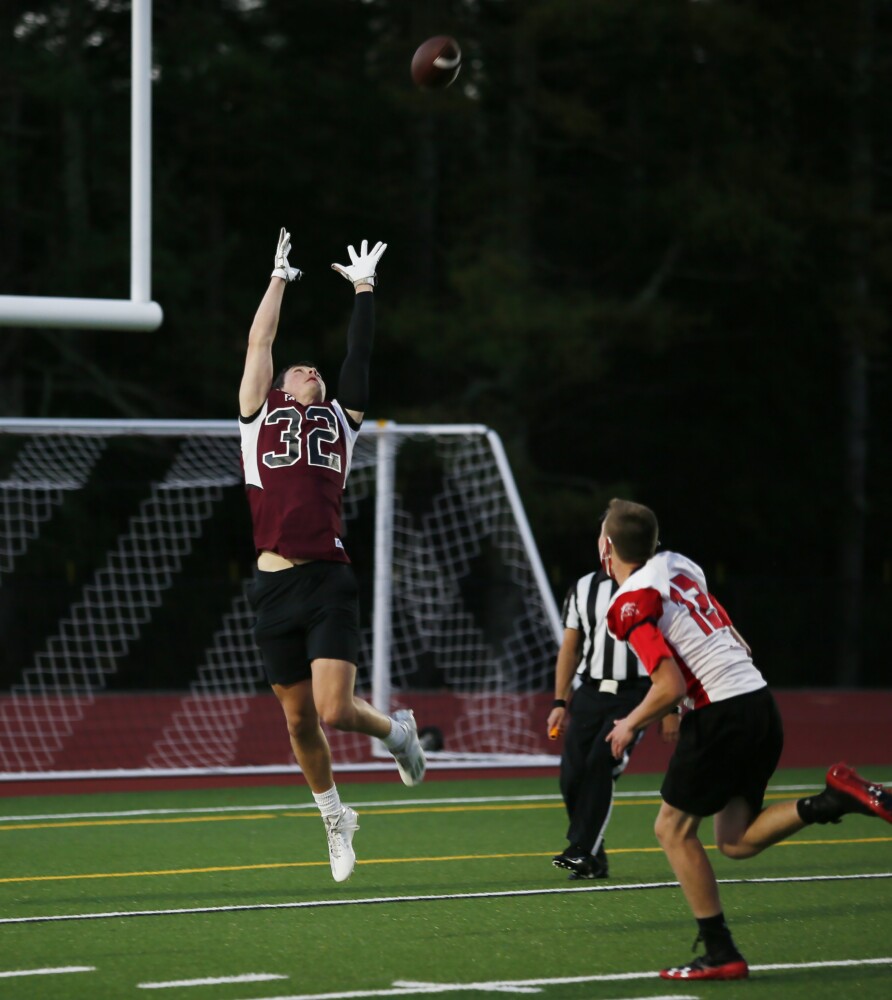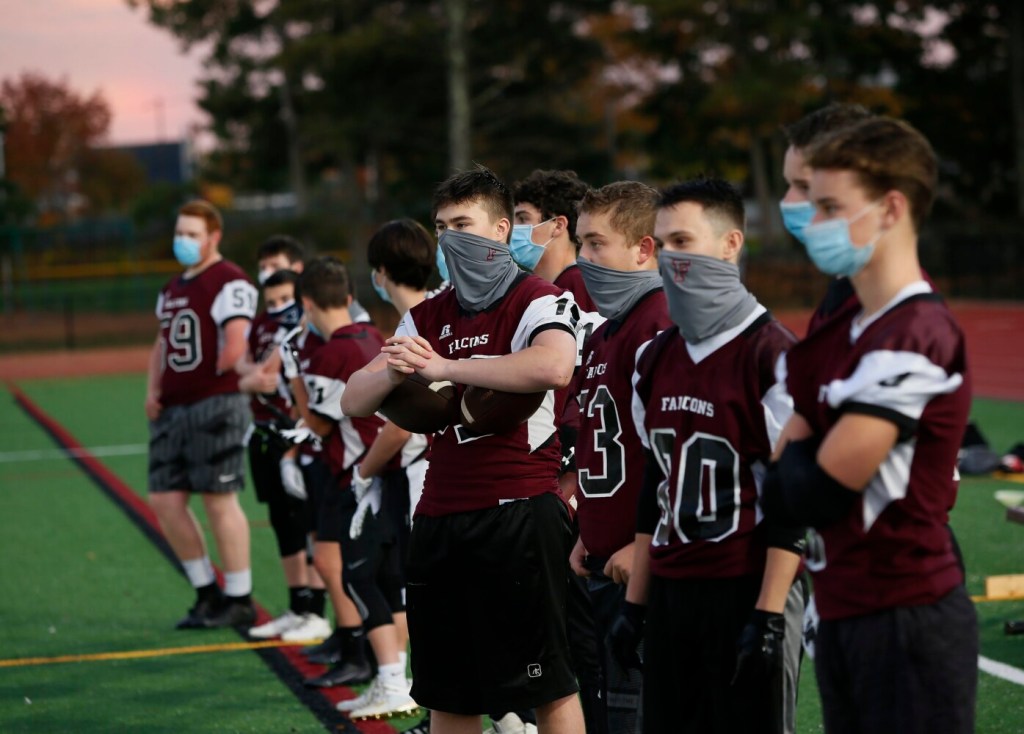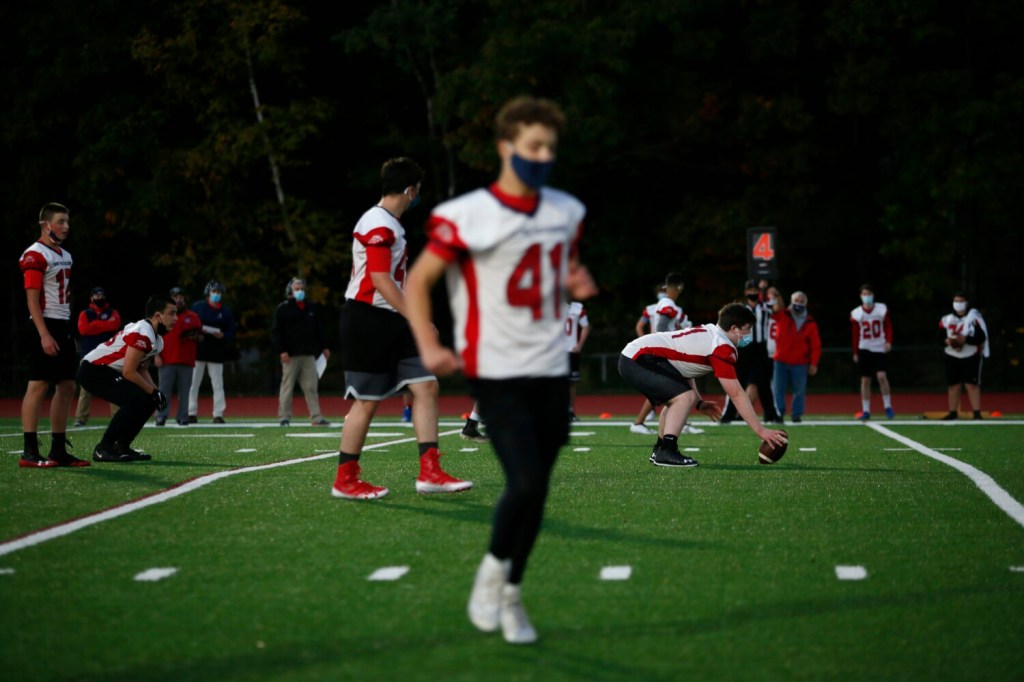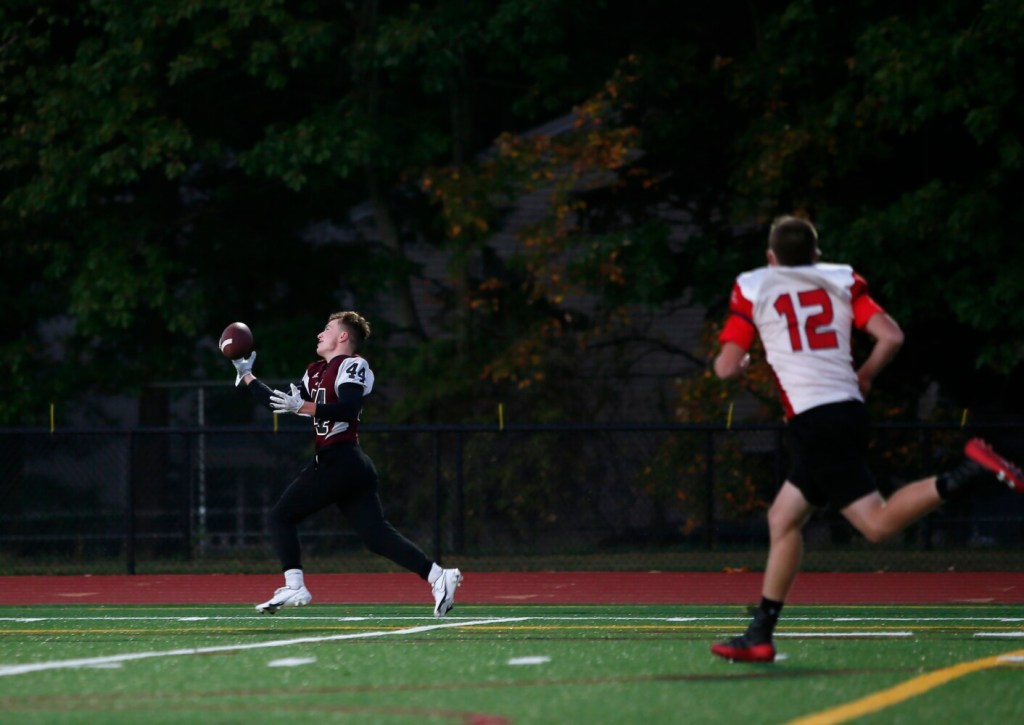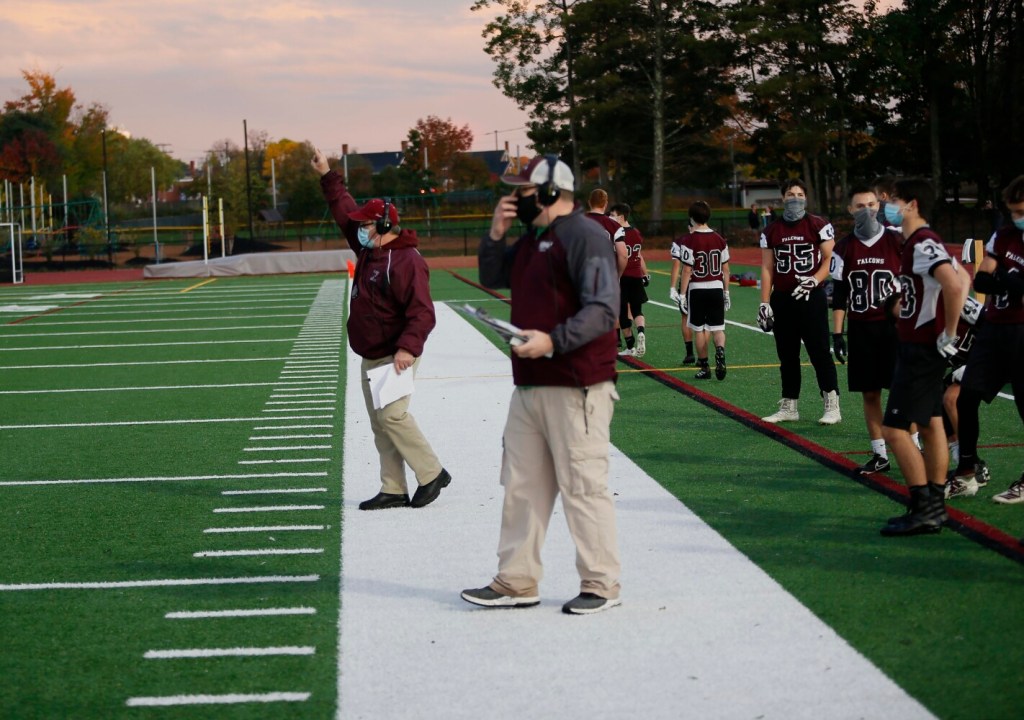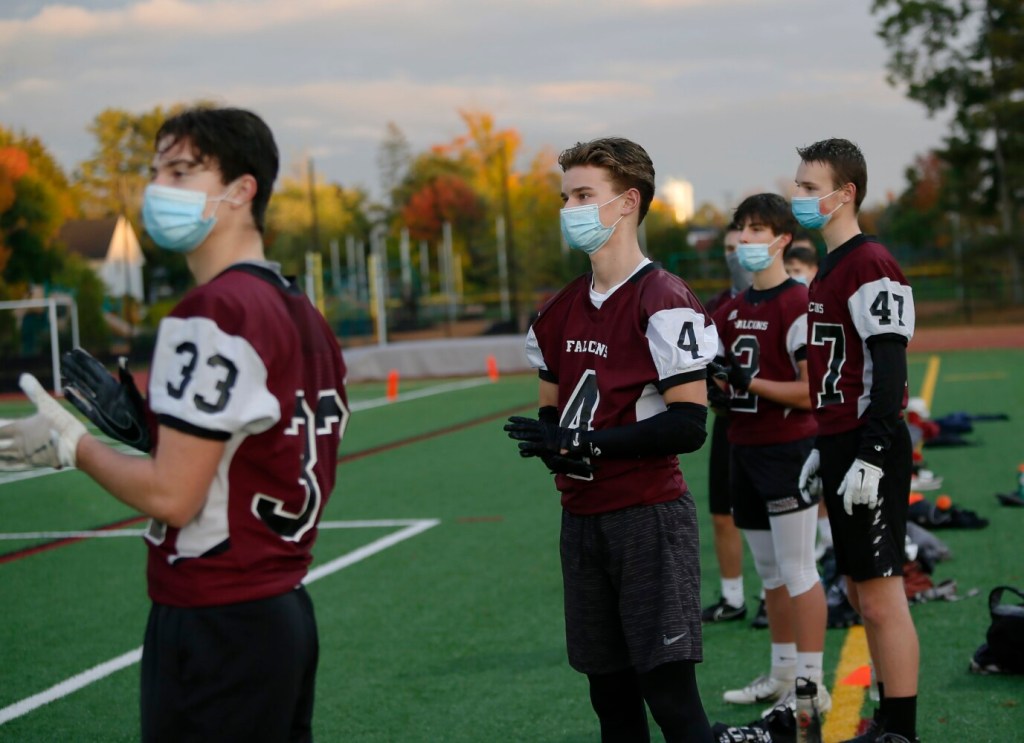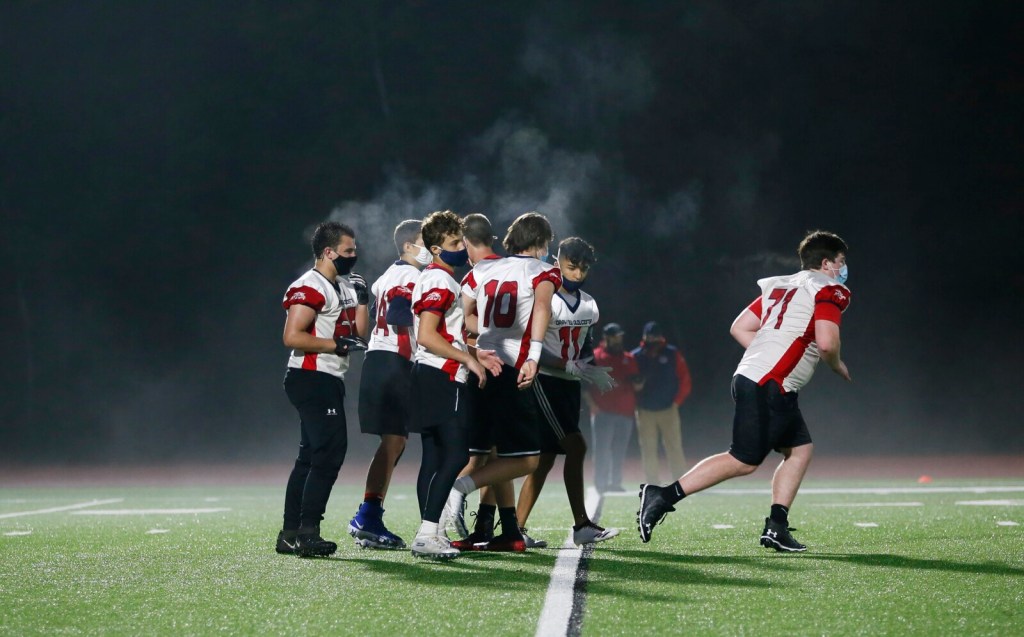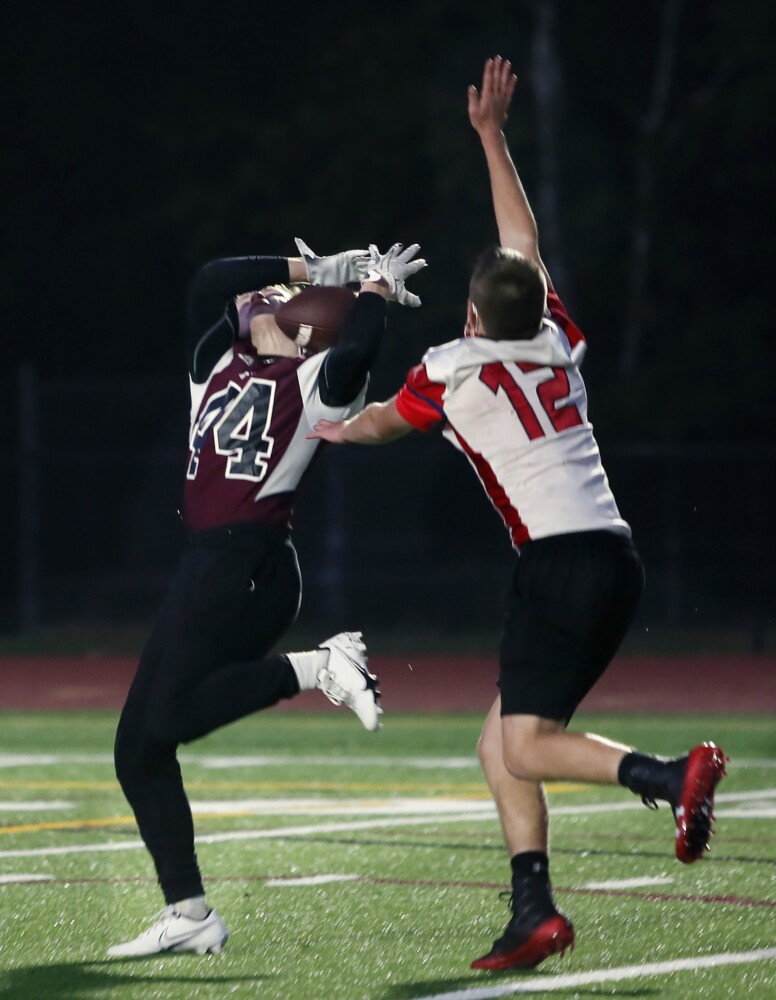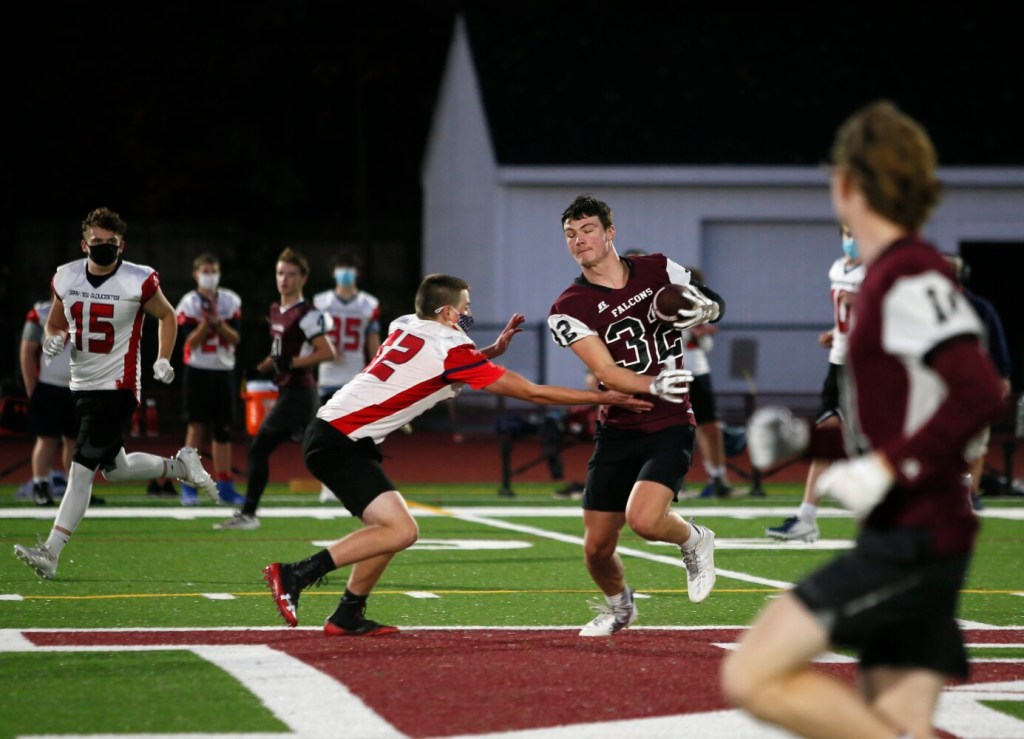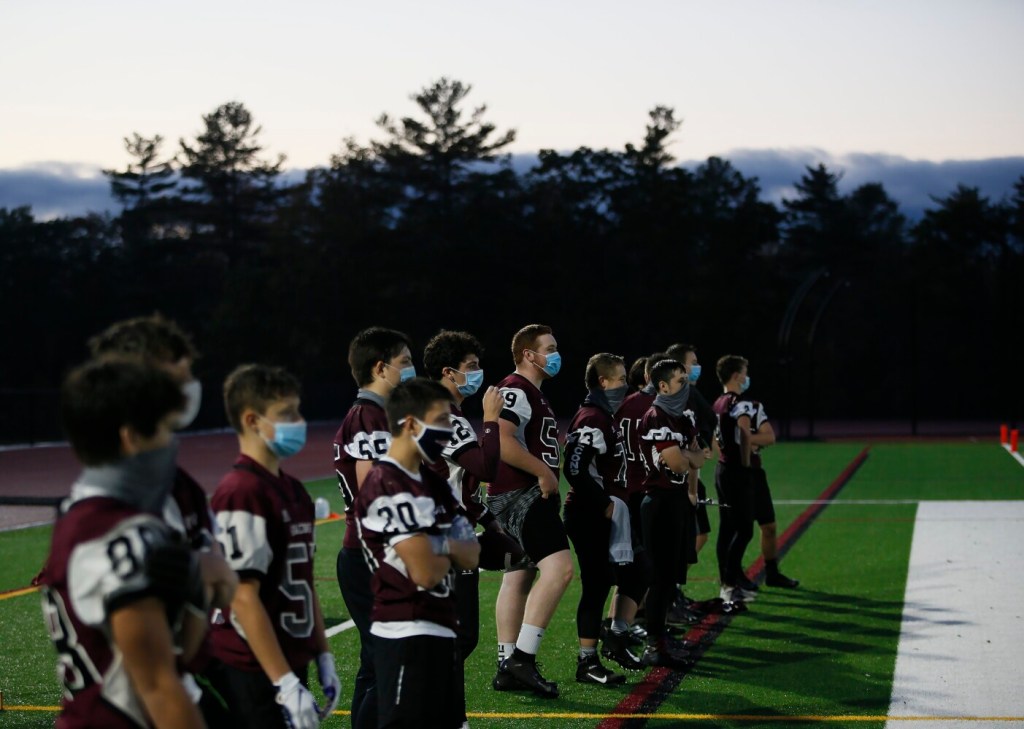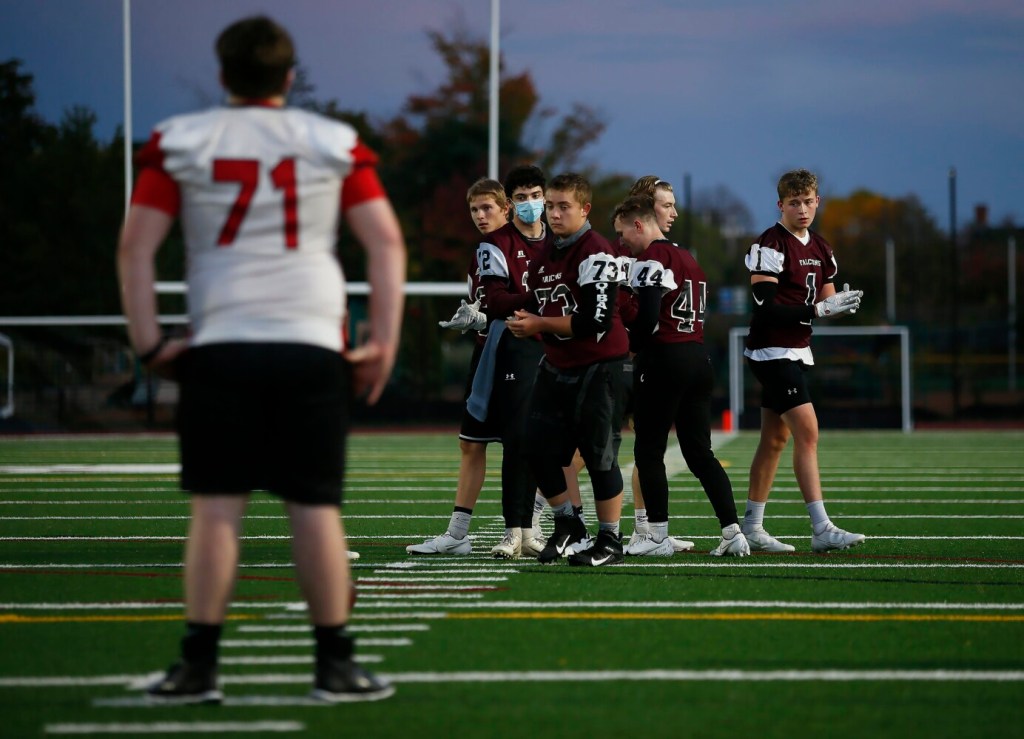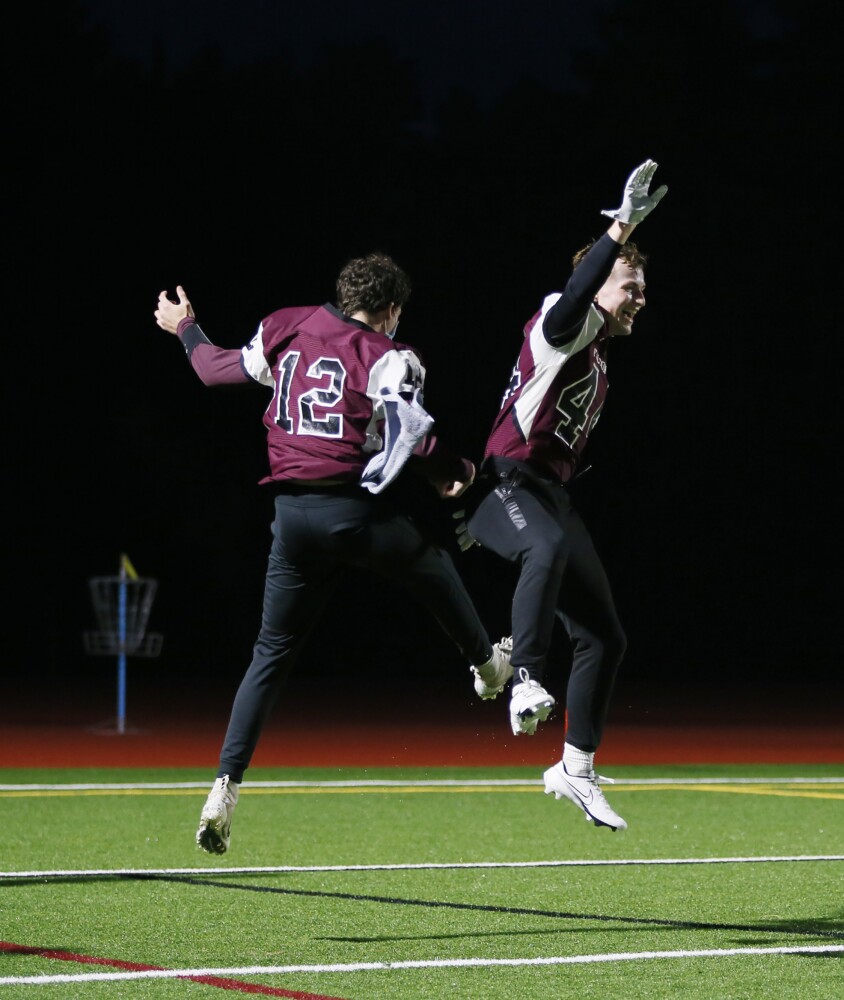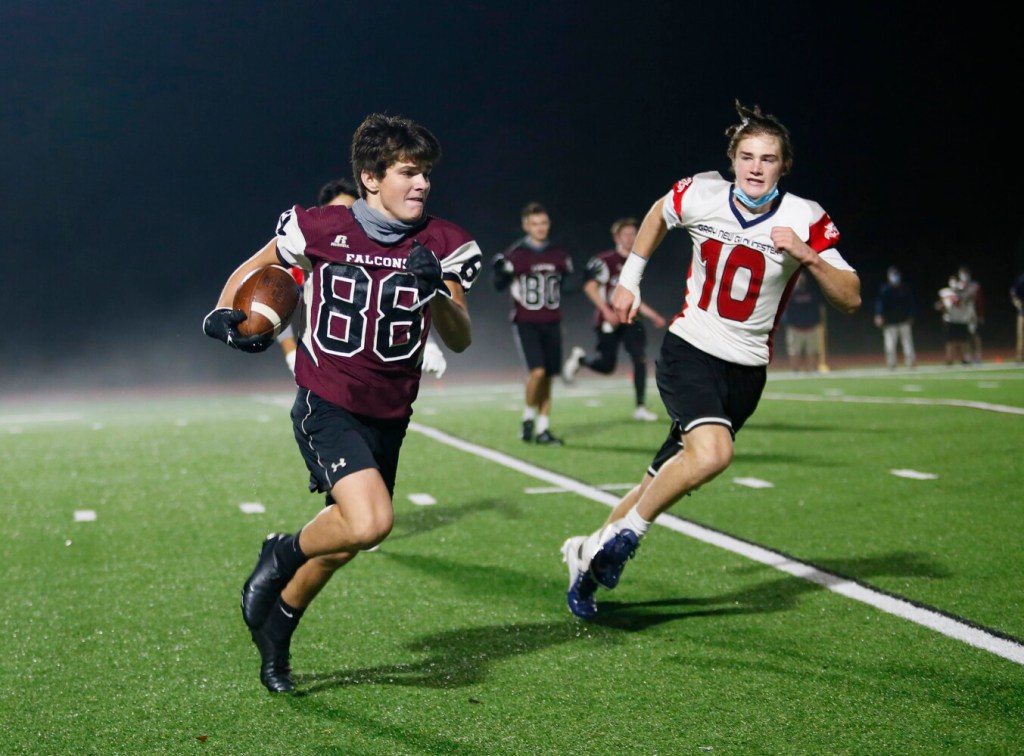It’s not real football.
It is real competition.
Such is the essence of 7-on-7 touch or flag football, the consolation prize given to Maine’s high school football community after it learned, officially, on Sept. 10 that there would be no tackle football season this fall because state health officials deemed it a high-risk sport that could contribute to the spread of COVID-19.
Still, teams are grateful to be playing games.
“That’s the key. It is competition,” said Freeport Coach Paul St. Pierre after his veteran team blitzed Gray-New Gloucester 49-0 in the first half Friday night in Freeport. “These are the die-hard football players in our town, and if all we offer them is two-hand touch football, they’ll take it.”
There is no tackling or blocking in 7-on-7, though that doesn’t mean there isn’t contact, especially when receivers and defenders are contesting for the ball. No running plays are allowed. There are no helmets, and no pads at all. Because there is no pass rush, quarterbacks are never in danger of being hit. They just have to get the ball out of their hand within four seconds.
Maine Principals’ Association guidelines suggest using flags as a means of downing opposing players. Old-time rivals Waterville and Winslow used flags in their game on Thursday. But, based on three games observed over two days in southern Maine, it appears many teams are using one- or two-handed touch.
St. Pierre said he prefers touch because it is a closer approximation of sound defensive football techniques, getting players to break down and get in a tackling position, as opposed to reaching. Mt. Ararat Athletic Director Geoff Godo said he opted to skip the flags because they would just create more “touch points,” that need to be sanitized.

Freeport High players watch the action from the sideline during the first quarter of their game against Gray-New Gloucester on Friday night in Freeport. Derek Davis/Staff Photographer Buy this Photo
Similarly, teams will be making their own choice whether to let linemen line up as receivers and quarterbacks for two of the four quarters, as set forth in MPA guidelines.
Neither Cape Elizabeth nor South Portland had their linemen running routes during their controlled scrimmage on Thursday. The same held true for Freeport in the first half when it was playing its varsity team, though lineman Cody Arsenault caught a touchdown in the fourth quarter.
Bangor Coach David Morris said he suspects some teams will get their linemen involved in 7-on-7 game play, “but we’ve chosen not to do that, just because, number one, they’re not used to running routes, and that in itself can be a safety thing.”
PLENTY OF ENERGY ON DISPLAY
As with other high school sports during the pandemic, 7-on-7 can rekindle old rivalries.
That was the case Friday afternoon when Brunswick, a Class B 11-man football power, crossed the Androscoggin River to play Mt. Ararat at the Topsham Fairgrounds. For decades, the Eagles were the poor little brother when it came to the football rivalry between the neighbors. But last year, Mt. Ararat opted to play eight-man football and ended up winning Maine’s inaugural eight-man championship.
Behind the on-point passing of senior Nolan Blessington, Mt. Ararat raced to a 34-12 lead late in the third quarter on Friday. Brunswick played the first and (most of) the third quarters with its regular linemen playing as quarterbacks, receivers and defensive backs. Mt. Ararat, with a much smaller roster and only three linemen suited up, essentially played its skill players the entire game.
After one Mt. Ararat third-quarter score on a deep pass over the middle, Brunswick Coach Dan Cooper jokingly asked of his linemen as they came off the field, “What, you guys never play secondary before?” To which, one player responded with a smile, “No Coach, we haven’t.”

Game officials are being used at 7-on-7 football games this fall. Derek Davis/Staff Photographer Buy this Photo
When Brunswick inserted its skill position players back into the game, the tide quickly turned, especially after a long interception return for a score by Cody Larson, an experienced defensive back. Brunswick eventually went ahead 40-34, only to have Blessington hook up with his favorite target, Shea Farrell, for the tying touchdown and go-ahead 2-point conversion with 1:54 left in the final 15-minute quarter of running time.
With Brunswick down to its last play, Dragons junior quarterback Weston Cooper unloaded a deep pass to the right corner of the end zone. Evan Kilfoil was well covered by Blessington but used his height advantage and excellent timing to go up, snare the ball at the top of his reach and secure the catch as he and Blessington collided.
Brunswick’s entire bench rushed into the end zone and, social distancing be damned, piled on top of Kilfoil.
“It feels amazing, you know beating your rival, having the game-winning catch like this. It’s just something that you dream about,” Kilfoil said.
Meanwhile, the look on Blessington’s face showed he was feeling the immediate competitive sting of a tough loss.
But when he walked up to Kilfoil a few minutes later, he gave his opponent his due.
“In a situation like that, you have to respect the pure athleticism,” Blessington said. “Even if it had happened the other way. Game recognizes game. He made a great play on the ball. You could tell the energy between these two teams was 100 percent real.”
“You could tell we both wanted it,” Kilfoil agreed.
‘A HUGE WIN FOR EVERY SINGLE PERSON’
Make no mistake, 7-on-7 is not the same as real football. Cape Elizabeth Coach Sean Greene said after a Thursday night controlled scrimmage against South Portland that one thing he and his coaching staff are working hard to address is to make sure his players, “don’t develop bad habits out here, because in all reality, they’re two completely different games. Football and 7-on-7 aren’t the same sport.”
Teams will make their own decisions on how serious they take the games and how many games they’ll try to get in.
Freeport’s approach is “to get as much out of it as we possibly can,” said St. Pierre.
That means teaching as much football as possible, he said, with the fervent hope that it can be applied to a spring tackle season.
“And then, most importantly, to have some fun,” St. Pierre said. “The last six months for everybody has been very difficult so anything that feels remotely normal or distracts us from what’s going on is a huge win for every single person that’s here.”

Caden Benedict of Freeport is tagged by Griffyn Gomes of Gray-New Gloucester after making a catch Friday night in Freeport. Derek Davis/Staff Photographer Buy this Photo
The MPA says it will work to create a spring season for football and volleyball, but that will hinge on pandemic conditions and what state agencies such as the Department of Education and Health and Human Services will allow.
For the players, fun, camaraderie and competition have value.
“I still get to see my boys. Still get to train in practice. I’d rather have this than no practice, no football at all,” said South Portland senior cornerback Jaiden Robinson.
“I like getting out here, playing with the guys, competing against the other team. Actually seeing another team,” said Cape Elizabeth senior quarterback Gannon Stewart.
“I’m taking this as serious as a real game,” said Cape senior captain and receiver Will Thornton. “I missed my season last year. I got hurt in the first quarter of the first game. I know what it’s like to miss a season. It is (tough), but Gannon and I have been working this whole off-season to hopefully get a full season in, and this is the closest thing we’ve got, so we’re going to work our asses off.”
“It’s a huge way to improve our games, especially with chemistry,” said Blessington. “It gives us the opportunity to be out there doing the thing we love with the guys, so any opportunity is good, no matter what.”
Even a burly lineman like Brunswick senior Thomas Seitz, who took several snaps at quarterback on Friday, can find some fun.
“Obviously I miss the season. My natural position is tackle. I love to play that position,” Seitz said. “But 7-on-7 is a breath of fresh air and it’s nice to go out and compete, and we have a good time.
MAKING THE BEST OF A TOUGH SITUATION
For coaches, and parents, acceptance of 7-on-7 is muted by the knowledge of what was lost and frustration that Maine, with one of the lowest rates of COVID infection in the country, is one of the 15 states not playing tackle football.
“Being an advocate for these kids, you just get frustrated when, in my opinion, there’s really no justification for the decision that was made,” Greene said.
“This has been kind of running through the motions and kind of half-measures,” said Mike Panenka, the father of Freeport senior lineman and kicker Miles Panenka. “It’s their senior year, so they want to get something of a football season, but it’s not quite the same for them.”
“I was really bitter at first because I wanted to play,” said Brunswick’s Cooper. “We feel we’ve got a really good team, a team that could three-peat (as Class B North champion) and get back to a state final and compete against a Marshwood or a Kennebunk. We felt this was our year, and when they said ‘No, we’re going to do it in the spring,’ I had a hard time believing them.”
Cooper then added, “any football is better than nothing. And these kids just want to play.”

Freeport players stretch before their touch football game against Gray-New Gloucester on Friday night in Freeport. Derek Davis/Staff Photographer Buy this Photo
What Cooper left unsaid, but is on the minds of players and coaches alike, is that athletes in York and Oxford counties can’t even play 7-on-7 – or any sports at all. York and Oxford are designated “yellow” counties by the Maine Department of Education, meaning there is an elevated risk of COVID-19 transmission. Under the MPA’s “Return to Competition for Competitive Activities in Maine” guidelines, schools in counties designated as yellow or red cannot hold athletic practices or participate in interscholastic contests.
“I definitely try not to think about it and just enjoy what we’re doing right now because at least we can get out here,” said Stewart, the Cape Elizabeth quarterback. “We don’t know in the spring if we will have a season, if we won’t.”
Usually, 7-on-7 is a summertime activity, a time for quarterbacks and other skill position players to sharpen their techniques prior to preseason practice in mid-August. This year, Maine’s tight limits on the size of public gatherings, and MPA guidelines that limited participation to only conditioning drills, wiped out the summer season.
“The way we look at it is, the summer was taken from us, the football season was taken from us,” Greene said. “This is basically our summer session.”
It is also an opportunity for high school seniors to get at least some representation of their skills on video, to aid in a potential recruiting process.
“It’s certainly mostly skill work, but it helps in evaluating those positions,” said University of Maine Coach Nick Charlton. “It’s our job to take the very best players in the state of Maine every year, like we’ve done the last couple of years. And any opportunity to watch these guys play is really important.”
“There are skill sets to be shown,” agreed Colby College Coach Jack Cosgrove, “and it will be helpful to the quarterbacks and receivers.”
Staff writer Mike Lowe contributed to this story.
Send questions/comments to the editors.


